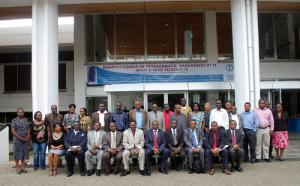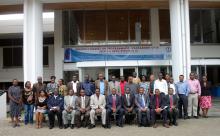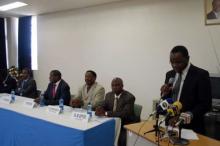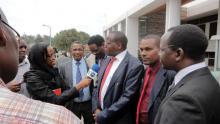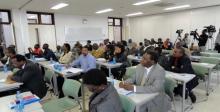Launch of the first Regional Course on Programmatic Management of TB, Tb/HIV and Drug Resistant TB at the Kenya Medical Research Institute (KEMRI)
Nairobi Kenya, 03rd September-12th October 2012 -- Tuberculosis remains a major public health problem in almost all the countries in the African region. Currently, the region accounts for almost 24% of all TB notifications globally and nine (9) out of the 22 TB high burden countries in the world coming from this region.
In addition to contributing to the highest TB burden in the African region, it has the burden of the HIV and AIDS accounting for over two thirds (67%) of all people living with HIV (PLHIV). Of the emerging concerns in the region is the emergency threat of the Drug resistant TB (MDR/XDR-TB) epidemic that has necessitated TB programs in the region to reallocate resources and focus to address the problem by reorientation of the staff on the new response in new clinical approaches, treatment regimens, commodity management, planning, research and surveillance.
Hence, the WHO Regional Director – Dr L. Sambo gave the orientation to develop this course to strengthen the Human Resource Capacity of countries in the African Region. The Kenya Medical Research Institute (KEMRI) agreed to co-organize the 6 week course with the generous support of WHO and partners finally culminating in the current course launched on 3rd September by Mr Mark Bor CBS – Permanent Secretary for Public Health on behalf of the Minister for Public Health & Sanitation.
The facilitators have been drawn from KEMRI, WHO at all levels, the private sector, other universities and both Ministries of Health. The course is modular (intensive and exercise based) and a combination of presentations, exercises, practical sessions and site visits. Twenty one (21) participants drawn from TB programmes at national and regional levels are attending the first course running from 3rd September - 12th October 2012 bringing together participants from 13 countries; Botswana, Eritrea, Gambia, Ghana, Kenya, Lesotho, Liberia, Malawi, Mozambique, Namibia, Tanzania, Uganda, and Swaziland.
The KEMRI Director in his speech mentioned that the institution has made great strides in harnessing interventional research issues related to TB and HIV/AIDS including drug trials aimed at reducing the treatment period from the current 6 to 4 months. KEMRI has also participated in the 2 year process for the development of materials used in this course as well as 2 Francophone courses which have taken place in Ouidah (Benin). He stated that KEMRI will continue to collaborate with WHO in this and other trainings that may become necessary in the future.
Dr. Rex Mpazanje (OIC) on behalf of the WR Dr Custodia Mandlhate represented WHO in the function. He stated that WHO Kenya is prepared to support the hosting of this course by both KEMRI and the Kenya government and will provide all necessary technical and logistic support.
WHO has sponsored one participant each from 12 countries in addition to supporting to the development of the training materials. He informed the gathering that, Other partners such as the USAID, UNAIDS, Institute of Public Health (IRSP) in Ouidah – Benin, Institute de Soins et de Recherché, Tradate, Italy also made contributions in form of cash and technical support during the development of training materials at different stages over the last 2 years. They have also sponsored some of the participants in this course. The WHO thanked Kenya Government, Hon Ministers for Public Health and Medical services, and Director KEMRI and his staff for accepting to host this TB, TB/HIV and MDR-TB training course in the KEMRI curriculum.
The Chief Guest - Permanent secretary in the ministry of Public Health & Sanitation (PS), Mr. Mark Bor, CBS, in his speech, on behalf of the Minister for Public Health & Sanitation and the Kenya Government expressed gratitude that KEMRI and World Health Organization (WHO) had partnered to make this unique training course a success. He noted that this course is important as it will address the huge burden of infectious diseases and in particular TB, HIV and most recently the emerging drug resistant TB that is threatening to reverse the gains that have been realized in TB control. He said it was worrying to note that about 70% of the estimated 36.1million people in the world with HIV and AIDS live in the sub-Saharan Africa and that 84% of all the estimated deaths due to HIV/AIDS since start of the pandemic have occurred in this region. He noted the 44% of persons dually infected is high though declining but noted that that the provision of ARVs has improved and lengthened survival of patients living with HIV.
Noting the importance of this course, the PS proposed to the organizers to consider increasing the frequency of the course to at least two per year and pledged Government support for this. The Permanent Secretary pointed out that the Government was grateful to both WHO and KEMRI for making the programme a success and urged other institutions/organizations to join and support the partnership so as to strengthen capacity for health care workers in responding to the emerging challenges of TB, TB/HIV and drug resistant TB.
For further information, please contact:
World Health Organization, Kenya 4th floor ACK Garden House.
1st Ngong Avenue off Bishop Rd.
P.O. BOX 45335, 00100 (GPO)
Nairobi, Kenya.
Email :wrkenya [at] ke.afro.who.int (wrkenya[at]ke[dot]afro[dot]who[dot]int)



